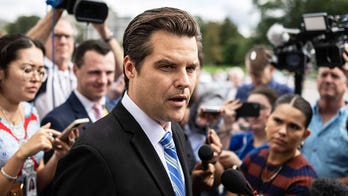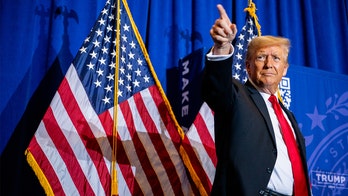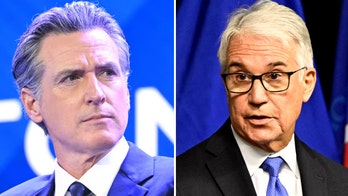Kurtz: How advisers are throwing Trump under the bus
'MediaBuzz' host Howard Kurtz weighs in on President Trump backtracking his comments during the Helsinki press conference with Russian president Vladimir Putin.
As the searing criticism of President Trump grows even hotter, the latest leaks suggest that an old and damaging pattern is repeating itself.
With The Washington Post reporting that "everyone around Trump" was urging him to be tough on Vladimir Putin—and that he largely ignored 100 pages of briefing materials—it's reminiscent of a phrase that his own advisers coined for him long ago.
As I detail in my book Media Madness, they call it "defiance disorder," when he blows past his advisers' urgent warnings and says whatever he wants to say. This is what happened after Charlottesville (more on that in a moment), and inevitably leads to corrosive leaks from frustrated aides and allies.
Axios, for instance, reports that a former senior White House official texted: "Need a shower." And a former national security official said: "Dude. This is a total [effing] disgrace. The president has lost his mind."
These people are being disloyal, of course, but the question of the moment is how and whether the White House can control the damage. Trump wasn't backing down yesterday, tweeting that "the Fake News is going Crazy" over his meetings with Putin and NATO leaders.
But does that "fake news" include all the people on the right who are ripping the president over Helsinki? The Wall Street Journal editorial page called Trump’s performance "a personal and national embarrassment." The editors of The Weekly Standard, while not fans of Trump, said he "brought disgrace on the presidency" and called for Congress to censure him. And there was criticism on Fox News and Fox Business from Neil Cavuto, Trish Regan, Stuart Varney, retired Gen. Jack Keane, National Review’s Andy McCarthy and many others.
By the afternoon, though, Trump attempted a partial walk-back. Reading from notes, he said what he wouldn't say in Helsinki, that he accepts the findings of U.S. intel agencies that Russia interfered in the election—while hastening to add there was "no collusion." He said at first he didn’t realize what the big deal was. But it seemed stiff and not especially convincing when Trump said that he had misspoken and meant to say "I don't see any reason why it wouldn’t be Russia," as opposed to would.
Meanwhile, what used to be a sort of fringe theory is now being openly debated, as in this New York Times news analysis:
"His statements were so divorced from American policy goals, so at odds with the rest of his administration, so inexplicable on so many levels that they brought to the surface a question that has long shadowed Mr. Trump: Does Russia have something on him?"
There is, it should be said, no evidence of that.
The media's moral outrage is reminiscent of what happened last summer when a Charlottesville protest by white supremacists and neo-Nazis led to clashes and one death, and Trump said there was hatred, bigotry and violence "on many sides."
On the Monday after that bloody weekend, as reported in my book, Trump's staff wanted a do-over, but Steve Bannon warned that the president would read the script without enthusiasm and the press would dismiss the effort.
That's pretty much what happened after Trump said that "racism is evil" and named "the KKK, neo-Nazis, white supremacists and other hate groups." The Huffington Post declared him "Late on Hate."
Sound familiar?
The next morning, at a routine press event that Bannon also tried to stop, Trump reverted to form, saying one side was "bad" but the other side was "also very violent," and that some of the protesters were "very fine people." A second firestorm erupted.
Could the same thing happen again?
In the end, Trump said what he said to Putin because he conflates the documented findings by American intelligence that Russia hacked and disrupted the 2016 election with the more personal attacks—largely lacking evidence—that he or his associates colluded with Moscow's efforts. That left him vouching for the "powerful" denial of a murderous autocrat and created the current crisis.
Maybe this will all blow over, like so many other controversies, after a couple of polls show that Trump's support among his base has not wavered. But the image of Trump and Putin on that stage will remain indelible.





